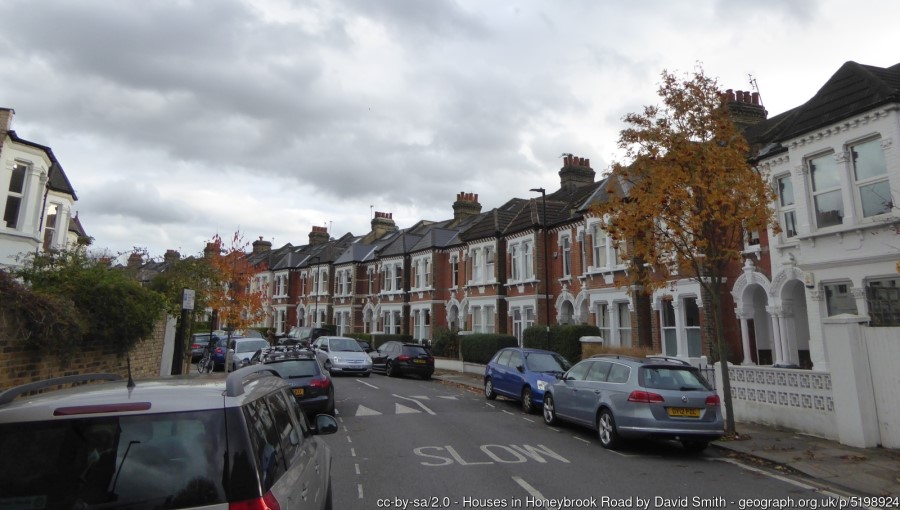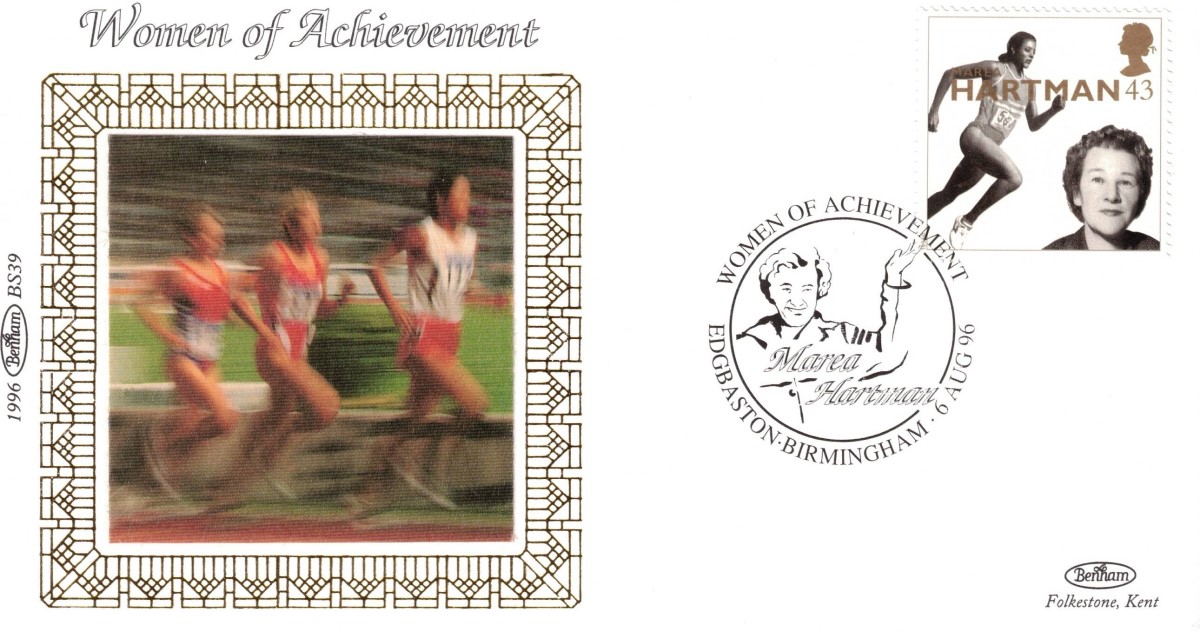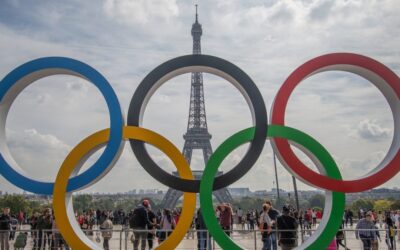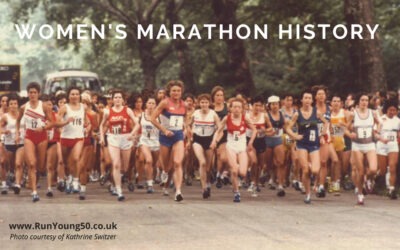When Marea Hartman died in 1994, she had been involved in the governance and administration of women’s athletics in England for nearly 60 years. One of her colleagues on the Women’s Amateur Athletic Association (WAAA), Vera Searle, regarded her as “the most important person in the history of English women’s athletics” and she was described variously as “the first lady of athletics“, “the doyenne of British athletics” and “one of the longest- serving and most influential people in athletics, an internationally respected figure.” John Rodda, athletics correspondent of The Guardian, gave his obituary of Hartman, the title “Marea Hartman – wisdom on the track.”
2022 marks the Centenary of the foundation of the WAAA, an organisation which Marea Hartman served from 1950 until its demise in 1991. This article seeks to give an overview of her life and contribution to women’s athletics and sport, both in the UK and internationally.
Personal life
Gladys Marea Hartman (known as Marea) was born on 22nd June 1920, the daughter of Ernest George Hartman, who was Swiss, and Esther Brook. Her family home was a modest terraced house at 33 Honeybrook Road, Clapham, London. Her sister, Leonora, had been born in 1916 and in 1924, her brother Douglas was born. Hartman’s parents both worked in the hotel catering trade and eventually rose to senior positions at the Savoy and the Waldorf respectively.
In a profile of Hartman published in The Times in 1972, Neil Allen recounts that her father was a good skier and her mother an accomplished horsewoman.

Hartman began university in 1938, reading Economics at the University of London. It was then that she became involved in competitive running because she missed being in the fresh air. In 1972, she told Neil Allen,
“I went down to the Motspur Track frankly because I wanted an excuse to get into a pair of shorts. I joined Spartan Ladies Club and soon I was running sprint relays for them.”
The Oxford Dictionary of National Biography (ODNB) entry for Marea Hartman outlines her personal life as follows:
“She won a gold medal as a sprinter for Surrey, and attended the international meeting in Cologne in 1939, six days before the Second World War broke out. During the war she served in the Army Welfare Division. Her fiancé was killed in the war and she never married. Although she achieved modest success as an athlete, it was as an administrator that she achieved international sporting fame…
“For over thirty years she was the personnel officer of Bowaters, the paper manufacturers. They were extremely tolerant, given that much of her time was devoted to nurturing female athletics and athletes.
Bowaters was based in Knightsbridge overlooking Hyde Park. Alongside her full-time job there, Hartman estimated that she spent 35 hours a week on her unpaid work as an athletics administrator. Neil Allen reports her as saying “If I wasn’t single I wouldn’t be able to do it all.”
Hartman was still running twice a week in her early fifties and said that it helped to relieve tensions.
Hartman remained fully committed to athletics until the end of her life. The ODNB entry states:
“Despite suffering from cancer, she attended the AAA championships in 1994 but was too ill to leave her Wimbledon home to go to the Commonwealth Games in Canada. She died of cancer at the Harestone Marie Curie Centre, Harestone Drive, Caterham, Surrey, on 29 August 1994.”
Marea Hartman’s service to athletics
In 1945, Hartman became Honorary Treasurer of the Spartan Ladies AC. This marked the beginning of what was to be a lifelong career as an administrator of women’s athletics. Five years later, she was appointed Honorary Treasurer of the Women’s Amateur Athletic Association. The posts she held at the WAAA were:
Honorary Treasurer, 1950 to 1960
Honorary Secretary, 1960 to 1991
Vice-Chairman, 1980 to 1991
In 1958, Hartman became the WAAA representative on the British Amateur Athletic Board (BAAB). The BAAB was the body responsible for international competition by British home nations. It was the BAAB that affiliated to the International Amateur Athletic Federation (IAAF). She went on to hold two roles there:
Honorary Treasurer, 1972 to 1984
Chairman, 1989 to 1991
As BAAB Treasurer, she found sponsors for BAAB international meetings and organised fundraising at a time when Government grants did not fully cover the costs of international competition.
Hartman joined the Executive Committee of the Central Council of Physical Recreation (CCPR) in 1972. The CCPR acted as an umbrella body for sports governing bodies. Hartman had two roles there:
Deputy Chairman, 1981 to 1983
Honorary Treasurer, 1984 until her death in 1994
In 1991, a unifying governing body was formed for British athletics, the British Athletic Federation, and at the same time the men’s and women’s governing bodies in each home nation merged. The WAAA merged with the men’s AAA to form the Amateur Athletic Assocation of England. Marea Hartman was unanimously voted in as its first President, a post she held until her death.
Hartman was the Team Manager for the English and British women’s athletics teams from 1956 to 1978, covering six Olympic Games as well as European Championships and British Empire/Commonwealth Games.
Hartman was elected a member of the Women’s Commission of IAAF in 1958 and served as the Commission’s Chairman from 1968 to 1981. She remained a member until 1994.
Marea Hartman’s impact on women’s athletics
In his obituary in The Independent, Arthur Gold, who had worked with Marea Hartman at the BAAB, described her impact on women’s athletics:
“In the post-war era women have been fully integrated into the sport, participating in nearly 20 different track and field disciplines, in internationals jointly with the men’s team, in cup competitions and, latterly, at grand prix events. This transformation was due in large part to the work of Marea Hartman, for 30 years Honorary Secretary of the Women’s Amateur Athletic Association. Hartman was one of the longest- serving and most influential people in athletics, an internationally respected figure, and Chairman for 13 years of the Women’s Commission of the International Amateur Athletic Federation. And all her work for the sport was carried out in a purely honorary capacity, without remuneration.”
In the 1960s, Hartman presided over one of the most successful periods in British women’s athletics. For example, at the 1964 Tokyo Olympics, Mary Rand won gold in the long jump and Ann Packer in the 800m, both world records. Packer also took silver in the 400m.
In her role as Chairman of the Women’s Commission of the IAAF, Hartman pushed for the introduction of new events for women in international competition such as the 1500m which was added to the Olympics programme at the Munich Games in 1972 and the 3000m which was added to the programme of the 1984 Los Angeles Games. Both of these events were part of the WAAA Championships long before they made it onto the Olympics programme. Hartman supported Kathrine Switzer‘s plans for an Avon International Marathon for women in London and her campaign for the marathon to be added to the Olympics programme.
Gregory Moon described Hartman’s impact in his PhD thesis:
“She negotiated most of the post-war sponsorship deals which kept English women’s athletics functioning during austere times. She was often a lone, but significant, female voice on key committees. She ensured that women were not marginalized, and spoke eloquently to the press in an effort to keep the sport in the public eye. Marea was a strong personality, whom Judy Vernon characterized as ‘a very progressive lady in certain espects and it was her who fought to have the 400 metres hurdles brought on as an event’. Vera Searle, who worked closely with her for many years, is adamant that English successes were mainly due to Marea Hartman’s tireless efforts and that she was the most important person in the history of English women’s athletics.”
Personality
From interviews with Marea Hartman, obituaries and other accounts, three aspects of her personality stand out. Firstly, that she was someone who was energetic, enjoyed what she was doing and liked to have fun. Secondly, that she was an astute negotiator, determined and patient. Lastly, that she had strong moral principles. She was widely respected as a dedicated and excellent administrator who was also sympathetic towards athletes.
In his obituary in The Sunday Times, Peter Jackson, General Secretary of the CCPR, wrote “her life was the epitome of probity and dedication“.
“In over 50 years of service to the sport, Dame Marea was never less than wholly committed. In a recent interview, she said that what inspired her in all that she did for sport was the sheer fun of it. This joie de vivre was as infectious as it was genuine. No-one could be in her company for long without feeling uplifted…”She got her way with charm and talent. She smiled easily and forgave readily. But she would never give way on a matter of principle.”
In his 1972 profile of Marea Hartman in The Times, Neil Allen conveyed her energy and enthusiasm:
“Miss Hartman works, drinks and dances with gusto, ends a party by doing press-ups, and smiles her way through even the extreme pressures of an Olympic year.”
John Rodda in his obituary article in The Guardian commented on Hartman’s “jolly, florid personality” and said that “her permanent smile had a way of winning points at the negotiating table.” The ODNB describes her as an ebullient personality “with a taste for Campari and soda, and always a ready smile for the cameras.”
Recognition
Marea Hartman’s name is not well known now but in her lifetime her service to women’s athletics and sport was recognised.
She was made an MBE in 1967, a CBE in 1978 and a Dame (DBE) in 1994.
She was made an Honorary Life Member of the IAAF in 1987 and was a Life Member of the British Athletic Federation.
In 1993, she received the Prince Chichibu Award for her impact on women’s sport in Japan.
After Hartman’s death, obituaries were published in the major newspapers.
A Service of Thanksgiving for the Life of Dame Marea Hartman was held at the church of St Martin-in-the Fields, London, on 28th November 1994. The HRH Duke of Edinburgh was represented by Jim Elms, Chairman of the Central Council for Physical Recreation. Lessons were read by her sister, Leonora Fielding, and Arthur McAllister, President of the British Athletic Federation. Mary Rand, Ann Packer and Mary Peters were amongst the athletes attending.
In 1996, Marea Hartman was one of five women chosen for a Royal Mail Women of Achievement first day cover on 6th August, alongside Dorothy Hodgkin, Margot Fonteyn, Elisabeth Frink and Daphne Du Maurier.
Marea Hartman was admitted to England Athletics Hall of Fame in 2012. The award was accepted by Mary Peters and her nephew, the actor Douglas Fielding. A silent introductory video shows images of Hartman and there is a video of the presentation video (watch from 9 minutes).
Marea Hartman features in The Athletics Museum’s digital exhibition created in 2022 to mark 100 years since the formation of the WAAA.
Notes
Sources for this article:
Dame Marea (Gladys) Hartman, Who’s Who UK, published online 1st December 2007
Dame Marea (Gladys) Hartman, Oxford Dictionary of National Biography, 28th May 2015.
The Official History of the WAAA 1922 – 2012, Mel Watman, SportsBooks Limited, 2012
“Tripping Daintily into the Arena”: A social history of English women’s athletics 1921-1960, Lynne Robinson. Submitted in part fulfilment for the degree of Ph.D. in Social History at the University of Warwick September 1996.
A New Dawn Rising: An empirical and social study concerning the emergence and development of English women’s athletics until 1980, Gregory Paul Moon – Submitted in part fulfilment for the degree of Doctor of Philosophy at Roehampton Institute London for the University of Surrey August 1997.
Marathon Woman, Kathrine Switzer, Da Capo Press, 2007
Newspaper articles:
The running, jumping, never-standing-still Marea Hartman, Neil Allen, The Times, 3rd July 1972
Dame Marea Hartman, Arthur Gold, The Independent, 30th August 1994
Death of Dame Marea, Huddersfield Daily Examiner, 30th August 1994
Wisdom on the track, John Rodda, The Guardian, 31st August 1994
Dame Marea Hartman, The Daily Telegraph, 2nd September 1994
Fond farewell to the first lady of athletics, Peter Jackson, Sunday Telegraph, 4th September 1994
Dame Marea Hartman, The Daily Telegraph, 29th November 1994
Related articles:
2022 marks the Centenary of the foundation of the WAAA. Find other articles about the WAAA here.




My mother , Leonora Fielder (Marea’s sister ) was born 16/7/1916 … there was a request to know her date of birth. Marea was adored by us all , she was one of the kindest most generous persons you would ever have the privilege to meet .She was never happier than when she could be with the family with a Campari and soda in her hand !! Her motto was ‘ be kind to the people on the way up because you might need them on the way down’ !!She was also very respected by the Japanese for introducing the ‘Ekiden’which enabled Japanese athletes to compete against other nations in this marathon , which took part in Yokohama .,
Thank you very much Mrs Foreman for providing me with Leonora’s date of birth which I have added to the article. Thank you as well for your personal recollections of Marea Hartman. I knew she had an association with Japan but not that it was about the Ekiden. I am grateful to you for sharing this with me. You may be aware that last year a digital exhibition about the history of Women’s Amateur Athletic Association was created. It includes a profile of Marea Hartman which I contributed.